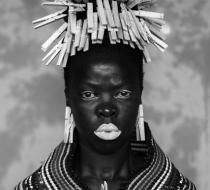Zanele Muholi: 'I'm a visual activist' Favorite
I am a visual activist. Most of what I have done over the years focuses on black LGBTQIA+ and gender-non-conforming individuals from South Africa and other neighbouring countries. It’s about making sure we exist in the visual archive. I call myself a visual activist — or, rather, a cultural activist, because this work is not only about the arts; I’m focusing on education, I’m dealing with culture in a way that confronts a number of issues.
I’ve made it my duty to produce historical content that speaks to me, because I’m one of us, not one of them. My life is about our collective lives; it’s autobiographical, it’s biographical; it is about the lives of black LGBTQIA+ individuals, especially human beings that I love and especially those that I feel. I need to know who they are, and why they do what they do.
“Faces and Phases”, the first of the three series shown here, commemorates and celebrates the lives of the black lesbian, bisexual and transgender humans I have met on my journeys. Some of their stories gave me sleepless nights as I tried to process the struggles that were described to me.
I am producing this photographic document to encourage individuals in my community to be brave enough to occupy public spaces, brave enough to create without fear of being vilified, brave enough to teach people about our history and to rethink what history is all about; to reclaim it for ourselves, to encourage people to use artistic tools such as cameras as weapons to fight back.
The same line of thinking is in “Brave Beauties”, which looks at the lives of black transwomen and gender-non-binary persons. It is sad when you look at the status of transwomen of colour over the past 10 years in the US and South Africa; you constantly read about violence and brutal murders.
So this series is aimed at undoing the negative portrayals; it shows people as strong, happy and able beings.
With Somnyama Ngonyama – “Hail the Dark Lioness” – I turned the camera on myself, as a response to the ongoing racism, the perpetual violence on black bodies in the mainstream media and the politics of exclusion. It’s also aimed at dealing with the personal. As photographers, we get carried away; we tend to focus on other people and forget about ourselves. I made the choice to expose myself because I felt that nobody could do it for me. I did it to remember me and to be remembered. I wanted to use my face so that likenesses will always remember just how important our black faces are when confronted by them. For this black face to be recognised as belonging to a sensible, thinking being in their own right. Remember that when you violate a person, it all starts with the face.
When it comes to the materials I use, I feel that sometimes you don’t need to be literal. Mundane objects can be read on multiple levels. Some images feature characters as the means to talk about historical events and others are related to personal relationships, such as my relationship with my mother, Bester Muholi (1936-2009). I want to give the viewer space, to allow them an intimate look when approaching each image. I believe you don’t need to be aggressive, always “in the viewer’s face”, because the situation is rough already.
What I’m doing is writing a South African visual history — I’m aware that I’m not going to be here for ever. I produce this work because I want my grandchildren, fellow activists in the LGBTQIA+ community and all those I care about to have access to information they deserve. I don’t believe we should rely on queer content that has been produced by others about us, instead we (re)create relevant content for posterity. We are here, and we can write, and we can contextualise and visualise our world as first persons. It is our responsibility to undo all the phobias wrongly attached to our identities such as transphobia, queerphobia, xenophobia, afrophobia, lesbophobia, homophobia.
‘Zanele Muholi Faces + Phases 2006-14’ is published by Steidl and The Walther Collection*. Her new book, ‘Zanele Muholi: Somnyama Ngonyama, Hail the Dark Lioness’, is due in April; aperture.org
*This article has been amended since first publication to correct the name of the publisher of Zanele Muholi’s monograph
Follow @FTMag on Twitter to find out about our latest stories first. Subscribe to FT Life on YouTube for the latest FT Weekend videos
Copyright The Financial Times Limited 2018. All rights reserved.









